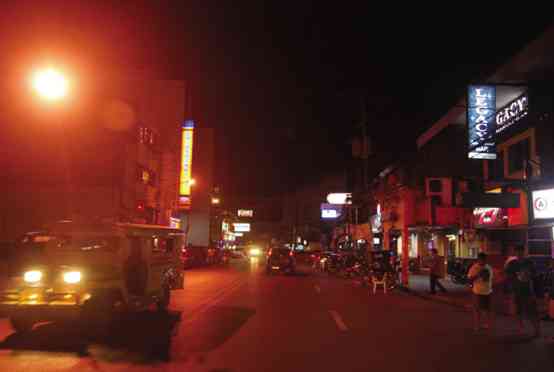
BUSINESS is slow in Olongapo City’s red light district after American soldiers were restricted to their ships following the murder of transgender woman Jeffrey “Jennifer” Laude on Oct. 11. ALLAN MACATUNO
MANILA, Philippines—At a glance, the street that hosts a stretch of entertainment clubs and restaurants in Olongapo City has not lost its charm and glimmer but a closer look these days would make one feel something is amiss.
On Sunday, all 15 tables at the American Legion Post 4 remained unoccupied even if it was nearing midnight. Only an American retiree in his late 80s and a young Filipina could be seen sitting in the bar area, both drinking the night away.
Barely an hour had passed when another American retiree and two women entered the bar. A few minutes later, the three went out.
“We’re not getting a lot of customers lately. Ours is just a small bar but we still find it hard to fill each table,” says Christine Esmar, supervisor of American Legion Post 4.
Although their customers, during ordinary days, are mostly American retirees, having US servicemen around helps boost their sales. “When there are US soldiers in the city, you will not find an empty chair here,” Esmar says.
She says businesses in the city’s entertainment district have felt the impact of US servicemen not being able to have rest and recreation outside their ships docked at nearby Subic Bay.
But these days, especially after the news about the murder of transgender woman Jeffrey “Jennifer” Laude broke, Esmar laments that customers come in trickles.
Sam Quimada, a cashier at A-Light Inn, says without the “shore leave” or “liberty” of American soldiers while they are in Olongapo City and the Subic Bay Freeport, their business would find it hard to keep afloat.
“US troops keep our business alive. If they will no longer be allowed to leave their ships, then we will definitely lose some revenues,” Quimada says.
A-Light Inn is just 50 meters from Celzone Lodge, where Laude was found dead on the night of Oct. 11. Laude’s body was found by a motel employee at 11:45 p.m., about an hour after she checked in at the motel with an American soldier, witnesses say.
Laude’s sister, Marilou, has filed a murder complaint against US Marine Pfc. Joseph Scott Pemberton, who, witnesses say, was Laude’s companion on the night she was killed.
Days before Laude’s death, the 30 rooms of A-light Inn were booked, day in and day out, Quimada says.
Unoccupied
But soon after some 3,500 US servicemen were barred from leaving their ships due to the investigation of Laude’s death, most of the rooms were unoccupied even on weekend.
“We’ve been affected by the murder of Jennifer. People are now hesitant to check in because they fear that what happened to Jennifer might also happen here,” Quimada says.
Gina, who manages an entertainment night club on Magsaysay Drive, says she could not understand why the business sector in Olongapo has to suffer from the death of one person.
Why blame Americans?
“These Americans should not be blamed for what happened to Jennifer. We need those US Marines. They should be allowed to enjoy their time when they are here,” Gina says.
Edith Labinpuno, 64, who sells perfume and make-up kits to women working in nightclubs, says she too felt the impact of the murder. “They are killing businesses in Olongapo. Americans should not be barred from having liberty while they are here,” she says.
Her customers, who pay her in installments, rely heavily on Americans, to earn. “Of course, these US Marines pay our women for their services. If there are no Americans around, how can these women earn? How can they pay me?” Labinpuno says.
When the US military controlled the former naval base in Subic, Olongapo City, a major commercial center of Zambales province, earned the reputation of being a “Sin City” for its red light district that was frequented by American soldiers.
The Americans left Subic and the former Clark Air Base in nearby Pampanga province in 1991, after the Senate rejected the extension of the Philippine-US military bases agreement signed in 1947.
But American troops have been returning to Subic, now converted into a free port and economic zone, after the Philippine and American governments signed the Visiting Forces Agreement (VFA) in 1999. Their ships have been regularly docking at Subic Bay as troops arrive to join military exercises with Filipino soldiers under VFA.
‘Unfortunate’
Olongapo City Mayor Rolen Paulino calls Laude’s murder “unfortunate” but says the city needs the US servicemen.
“If people in this city were to be asked, 19 out of 20 would say they want US troops to go on liberty or rest and recreation while their ships are on Subic Bay,” says Paulino.
He says the tourism and business sectors suffered in the aftermath of the Laude murder. “People here have been looking forward to the liberty of the US troops because we will earn from it,” he says.
Even tricycle drivers and vendors, Paulino says, welcome the presence of Americans in the city.
“Our country is promoting tourism and we see these US troops as tourists. There’s a chain of reactions when US servicemen are here; our business and tourism sectors get a boost,” the mayor says.
“For the longest time, Olongapo has been host to the US Naval Base and we treat the Americans big brothers,” he adds.
RELATED STORIES
Pemberton a no-show at preliminary probe into transgender slay
Pemberton should appear in preliminary probe ‘for his own sake’—DFA
Pemberton must show up Tuesday–De Lima